Reply To:
Name - Reply Comment
Last Updated : 2024-04-25 17:00:00
Interview with Exiled Iranian Cartoonist Kianoush Ramezani
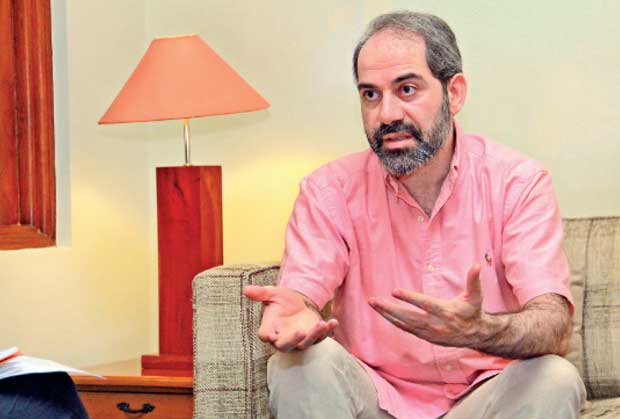
In 2009, the controversial Presidential election in Iran was met with mass public protests. What followed was State-wide crackdown on dissent. Iranian cartoonist Kianoush Ramezani, the founder of the country’s first independent cartoonists’ association was forced into exile. He is among Iranian intellectuals, journalists and bloggers who were forced to leave the country. Kianoush is no stranger to peril as he believes cartooning is ‘the art of danger’. In an interview with Dailymirror during his recent visit to Sri Lanka, Kianoush talks about his encounters with danger, the freedom of expression he strives for, the balance of satire, religion and the power of cartoons. Excerpts of the interview:
Iran was met with mass public protests. What followed was State-wide crackdown on dissent. Iranian cartoonist Kianoush Ramezani, the founder of the country’s first independent cartoonists’ association was forced into exile. He is among Iranian intellectuals, journalists and bloggers who were forced to leave the country. Kianoush is no stranger to peril as he believes cartooning is ‘the art of danger’. In an interview with Dailymirror during his recent visit to Sri Lanka, Kianoush talks about his encounters with danger, the freedom of expression he strives for, the balance of satire, religion and the power of cartoons. Excerpts of the interview:
Q What was Iran like during your formative years and what made you become cartoonist?
I was born and grew up in North of Iran which is different from the rest of the country. My region is famous for having trouble all the time. We think too much and we create trouble for ourselves. It has been also famous for having peaceful deposition. They are always unhappy with their own government or state; it has been like that for over a century. When a child like me is born in this context he becomes a problem child. I was born in 1973. My family encouraged me to keep drawing which was what I was good at. But I didn’t want to draw objects. It was a cliche, an obligation and a lesson. I refused, I wanted to draw the images in my head. My parents encouraged me. I studied by myself, I never studied art and never went to art school.
However when I was 18, I discovered cartoon was the outlet I was searching for since childhood. I wanted to give a message beyond my drawings. Then I realised that this form of art exists and it’s called cartooning. When I was in the University I started on my first cartoon exhibition and immediately I started working with the local newspapers. When my first cartoon was published, I was excited about the possibilities. That’s how I became a cartoonist.
QHow accommodating was Iran for a cartoonist?
Iran is a very different country when it comes to cartooning. It is a very developed country, where the tradition of cartooning is very advanced, which is good and bad at the same time. Bad because the regime knows about the impact of cartooning on society. Iranian people love humour, but they are also intelligent, they love to make jokes about the state. It has been a tradition and which is still alive. Criticial humour is alive in society because they cannot criticise the State and Government directly as we are under pressure all the time.
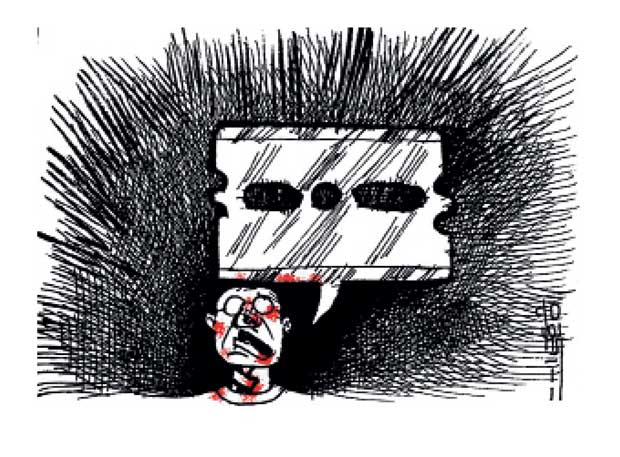
We have some sort of an advanced dictatorship which means the existence of a State with religion. This gives the authority the maximum power to control and survey people. When the Islamic Revolution happened in 1979 the State decided to control cartooning in a very precise way. Some cartoonists were appointed to direct this role and until now they are actively controlling and exerting pressure. For instance, I was threatened not by the intelligence service or by the State but by the Director of the Iranian House of Cartoon, the institutional centre funded by the State.
In Iran we have a government which is a kind of a joke, and also we have the State. Whenever there is a need for the propaganda to use cartoon this Iranian House of Cartoon makes the approach. For example they organised a second international cartoon competition against the Holocaust which ironically took place right after the attack on Charlie Hebdo.
QYou’re living and working in exile and as a political refugee since 2009 in Paris. What are the events that led to this?
If I wanted to be a real cartoonist I had to be independent. I decided to not obey the Iranian House of Cartoonist. In Iran to find a job and to be able to work we had to adhere to the House of Cartoon. I denied this and my problems started. I went too far by deciding to create the first independent Iranian cartoon associations. I received threats, all my projects were suspended and I created a very domestic enemy. In 2003 I was appointed the Iranian representative for the cartoonists right network international, which is a Human Rights Organisation who were trying to help and defend cartoonists in trouble. It was a huge risk for me because I was appointed by a Human Rights organisation. In Iran, no human rights organisation is safe. In 2009 the State started to arrest bloggers, journalists and then my close friends. So I made the choice to leave and continue my activities from abroad. Exile became the choice and I found myself in Paris through the Embassy of France.
QWith what you have observed in Sri Lanka during your stay, are there any parallels that could be drawn between Sri Lanka and Iran?
I appreciate the recent developments in democracy in Sri Lanka. My first question about this country was if internet was free here, and they said yes. To me this is very important. Then I learned that this county is in a very interesting process of change towards freedom of expression. I learned that it wasn’t this way before. Before coming here I had some image of your country through some Sri Lankan friends I found in Paris. They are in exile, they were activists and journalists from Sri Lanka. When I came I was surprised in a good way.
My experience is from the Alliance Francaise event we had in Kandy. The experience I gathered there was very interesting. Some locals were defending limitations in freedom of expression and I love this debate. Now again in Colombo I’m also enjoying this observation. I feel this change and I can relate to it, I feel a thirst for change. I hope that in near future all journalists will be happy in Sri Lanka.
QCartoons have been known to strike a nerve with political figures worldwide. How and why do politicians react to cartoons?
Some politicians are aware of the strong impact of a cartoon. Either they take care of it, which means that they start to observe it and they start to use it, which is the
intelligent way.
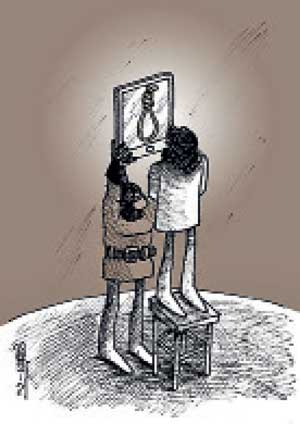
Or they hate it and then the problem starts. In a democratic country, no President likes to be criticised. But I believe that they don’t declare any disagreement. They start to observe, they start to see. I believe it can also help them.
Cartoonists don’t criticise the system just to criticise. They also are trying to bring attention to an issue to fix it. I believe that independent cartoonists are observing the system, the society, government and politicians for good. Because they are sensitive, they are people searching for development, for better conditions for everyone. We have been misunderstood by some states, especially the religious states, they believe that we are some clowns who are mean and our job is just to insult people, which is not true.
But of course, when it comes to criticising an issue cartoonists use blasphemy as well. Sometimes they make fun of the Pope or even the Prophet. If there is a message behind this, I appreciate it. But sometimes I dislike for example what Danish cartoonists did with the cartoons about the Prophet. They are free to do whatever they want but I didn’t find any intelligence behind it. For cartoonists I must say, use your freedom for some good, use your freedom for value.
QDo you find faith and art in conflict?
It depends on the definition of faith. My definition of faith is very Persian. 5000 years ago we had faith without having any religion. For Iranians religion doesn’t exist because we don’t need it. It’s a very tricky thing to say because our country now is a Muslim country. Traditionally and officially they are declaring themselves Muslim and Shi’ite. I had to declare that I was Muslim and Shia even if I don’t care about anything else. Because it is the only way you can receive some official papers. But Iranians can always be spiritual. So my definition of faith is spiritual which has been the philosophy of Zarathustra, respecting spirituality and humanity. Then Islam came to Iran. Let’s say, they occupied Iran. Iranians adapted Islam in the Iranian way. That became the current Islam. Most Iranians, they don’t say prayers but they believe in God. I’m one of those. We believe that we don’t need any religion to be blessed by God.
The only dialogue that we can have with God is to be thankful for everything. We are responsible for own destiny. Coming back to cartoons with this kind of faith, I’m a very big fan of blasphemy. Because it prevents the authorities to use any form of religion to empower dictatorship. I’m traumatised by the Islamic State of Iran.
QAs a cartoonist who sought political refuge in France, what was life like before and after the Paris attacks?
Life in Paris had its Parisian definition which means that life is difficult but carpe diem! or Vive la liberté! I was enjoying my freedom and I’m still enjoying my freedom. But after the January 7, 2015 I know that I’m not safe any more. I know that nobody can guarantee my security and I know that there is a domestic enemy called the radicalised people. They are French, they don’t come from the sky, they don’t come from Syria. They are born and bred in France. They are fortunately full of hate and can easily manipulate hate. That’s what happened to them. Most of these terrorists are still in prison. When they came back to society then they started their operations.
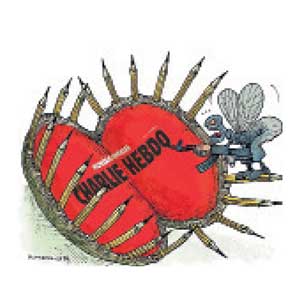
But then I found myself ten times more motivated for my visions. That also made me to create the International Organisation United Sketches. It’s the only international organisation of cartooning that has two target missions to support cartoonists in exile, promoting freedom of expression in the world of cartooning. After the Charlie Hebdo attack many cartoonists started self-censorship even if they are living in a free country which enjoys democracy. They are afraid, and they will not draw as they used to draw. I really feel this necessity to remind them that freedom of expression is a necessary material to have as a cartoonists. Without this we are not cartoonists any more. We are just illustrators or some tool of propaganda.
QMuslim extremists attacked the Paris office of the French satirical newspaper Charlie Hebdo, killing 12 people, including the editor and several cartoonists in 2015. Prior to the attacks, you had spoken of warning signs of an imminent attack. What was the reason for these statements?
I have the experience of living in an Islamic State. I know how an Islamic State works and I also grew up where besides me were radicalised people. And I know how Sharia works. Sharia has nothing to do with Islam. It is a very dangerous and changed way of using Islam to empower any authority. This is dangerous because I can compare this extremist Islamism to Nazi rule. They keep themselves alive to look at the others from above. To them we are inferiors and they know better than us and they want to correct the world in their own way. Which is very similar to the ideology of Hitler. That is why they can simply kill because for them it’s a sacred way, they don’t feel ashamed or guilty. They glorify themselves using this. That’s why we see how simply they can kill themselves in suicide attacks. They don’t think they are going to die or lose anything. They think they are going to the uppermost level.
I also know that we cannot change their minds. They never forget and they never forgive. When French media invited me to debate on the topic and by chance I met Charb the editor in chief of Charlie Hebdo (Stéphane Charbonnier) and I asked him if he knew that he was in danger. I told him, I know them, they are not going to stop. He said “Don’t worry, come on, we are in France.” I believe that either he knew or he couldn’t really understand the ideology behind this.
QHave these incidents changed the way you approach freedom of expression?
Let’s say in Western countries in a democratic country, lifestyle is very peaceful. In this way, we forget many threats. To confess, even though I warned Charb, I also forgot after two years .I even forgot that these threats exist and that its close to me. When finally it happened in 2015 after 3 years, they were surprised. Charb even had bodyguards and police. But it’s not enough. Another attack happened in the centre of Paris when people were most unsuspecting.
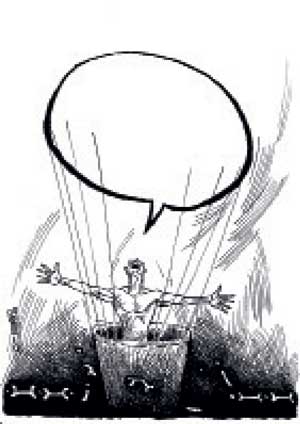
I’m still worried about these terrorists, about how they view the terrorists. Whenever I hear or read that terrorists have been imprisoned it makes me mad. Because you need to accept a danger and you need to be prepared. If you don’t know this, it’s like putting a wounded wolf in a cage and putting the cage in the middle of a flock of sheep. After a while you start to believe that the wolf is integrated with the sheep, and then you go and sleep. What will happen? This is the same. I believe the security measures must change. The President of a country after each terrorist attack calls for retaliation, even if it is Iraq or Syria. It is the most stupid declaration that I have ever heard. The danger is domestic and has nothing to do with the people from miles away. It brings more hate and it’s not helping. That’s why it makes me mad. I know how they can prevent this or reduce this.
QBeing away from Iran how do you observe your country from afar?
Thanks to social media I maintained my activities and connections with the people and with my friends. They accepted the risk. We used for example services like the Telegram app to communicate. Fortunately, the Iranian specialists who were also in exile gave me a security background from outside. They prepared software like the VPN and they sent it for free for Iranians. That’s how we could use the free internet and till now there are very active websites always updating these VPNs for free. This way people still can be connected through social media. In this way,I can keep my connections and I can still publish my works.
QIn your work, you are also a commentator of the situation in the Middle East. With Russia, Turkey and Iran now outlining a plan to reinforce a ceasefire in Syria, what do you see in this latest development?
Since 2012 I started drawing about Syria. I didn’t do the same things that European cartoonists did with my cartoons. I didn’t see Bashar Al Assad as the beast and the opposition as angels. That is stupid. Because I could see people out there dying. I illustrated them both as a beast. Because to me they are just fighting for power. There is no glory in this fight and now after many many years, unfortunately we see that now the world must negotiate with Bashar Al Assad. He is still there. All these bombs and all this effort it didn’t work. What happened all these years, millions of people were displaced, tortured, killed. I don’t glorify the Syrian opposition because they are responsible for their own nation’s suffering. My point of view is to condemn both sides and to condemn the war. I would also wish that the international community realise that they shouldn’t send their soldiers there at all and contribute to this war.
QWith a new President at the helm of affairs in America, what fate do you see for the future of Iran’s relations with the US?
The relationship is already developing and it’s not thanks to President Obama. They had already been negotiating benefits. America has a lot of friends in Iran. At least 10 years ago in the field of petrochemicals and the oil industry and very surprisingly beverage giants like Coca-Cola. Iran has the biggest factory of Coca-Cola and Pepsi Cola in the middle east, and they were established 25 years ago. During Friday prayers each week, you would hear calls saying ‘down with the USA’.
At the same time, these very people will be counting their money saying, how much did we earn? I believe that at the age of Donald Trump, they have to keep Israel satisfied too. But I don’t believe that there is going to be some serious disagreement or serious conflict between the two countries.
QAny thoughts on the Saudi Arabian Foreign Minister’s statements that it will act with Trump to contain Iran?
Saudi Arabia is one of the most unwise countries in their foreign policy. Whenever I read some news about Saudi Arabia it drives me mad. No one is supporting
their policy.
They also lost a lot of influence in the United States. I believe that in Trump’s time the influence in the US will be less. It seems as if they are building relations but they are not doing well. Who will be the winner in this big circus? I believe unfortunately Iran ultimately will be the first power of the
Middle East.
QWhat message would you give as an artist and activist lobbying for freedom of expression?
I observe the society and the interactions between human beings - philosophically, politically
and instinctively.
This is my main source of inspiration. I provoke society to remind it to act and sometimes to react. I put activism in every single line, pixel or kilobyte. My main intention is to remind the value of freedom of expression as a fundamental rights for
human beings.
My art is my activism and my activism is my life.”freedom of expression” is my main profound motivation for creation and it is present when I’m drawing, when I’m making a video art or delivering an artist’s speech. My name is known as an engaged activist and cartoonist by dozens of interviews with international media and journals, but my goal is to show the art of cartooning as a very powerful contemporary art.

Add comment
Comments will be edited (grammar, spelling and slang) and authorized at the discretion of Daily Mirror online. The website also has the right not to publish selected comments.
Reply To:
Name - Reply Comment
US authorities are currently reviewing the manifest of every cargo aboard MV
On March 26, a couple arriving from Thailand was arrested with 88 live animal
According to villagers from Naula-Moragolla out of 105 families 80 can afford
Is the situation in Sri Lanka so grim that locals harbour hope that they coul